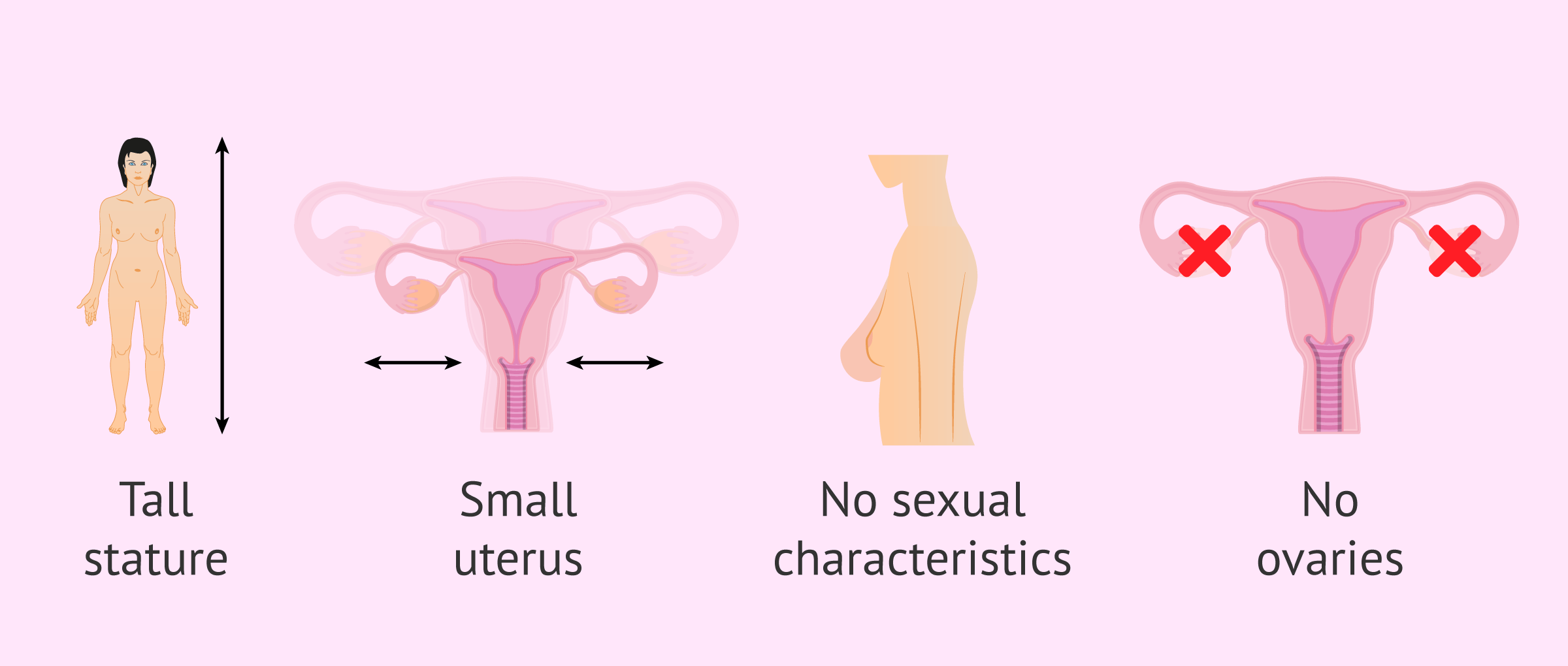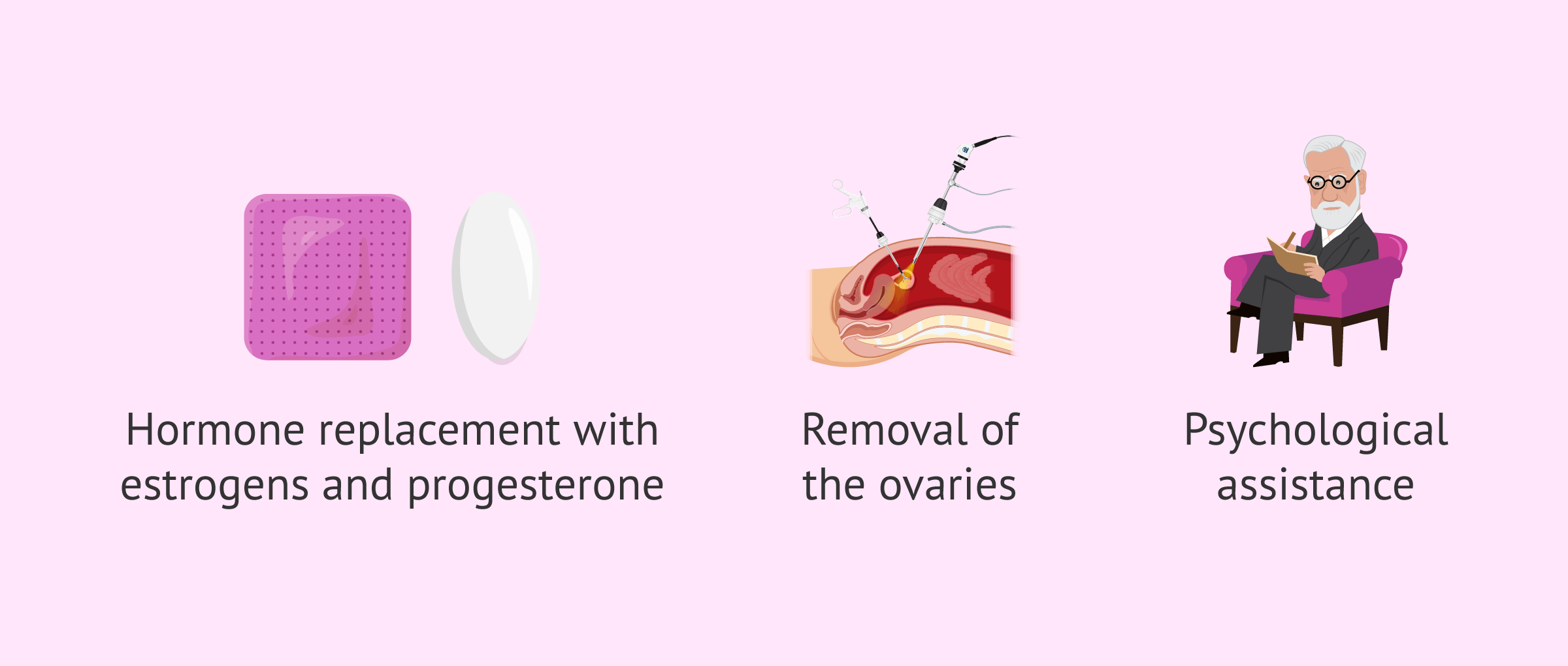Swyer syndrome, also known as pure gonadal dysgenesis 46 XY, is a genetic disorder of the sex chromosomes characterized by the absence of correlation between the sexual phenotype and the genotype.
Therefore, people with this disorder have a male karyotype (46, XY), but anatomically there are female characteristics. Specifically, these XY women have sexual organs such as the vagina, uterus, and fallopian tubes, although they do not have ovaries.
Normally, Swyer syndrome is caused by a mutation in the SRY gene, although the exact etiology is unknown.
Provided below is an index with the 10 points we are going to expand on in this article.
- 1.
- 2.
- 3.
- 4.
- 5.
- 6.
- 7.
- 7.1.
- 7.2.
- 7.3.
- 7.4.
- 8.
- 9.
- 10.
What is Swyer's Syndrome?
Swyer Syndrome, also called pure gonadal dysgenesis 46 XY, was first described in 1955 by Dr. Swyer.
In general, this genetic alteration is associated with a mutation in the SRY gene (male sex determinant gene), which inhibits the differentiation of embryonic gonads into testes. However, there are mutations in other genes that also cause this syndrome, , such as the SOX-9 gene and WT-1.
Women with Swyer syndrome have XY sex chromosomes instead of XX, although they have a female reproductive anatomy. Therefore, these patients have vaginas, fallopian tubes and hypoplastic uterus.
It should be noted that Swyer syndrome is rare and it occurs in approximately 1 in 80,000 births.
What are the causes of Swyer's syndrome?
Currently, the exact cause of Swyer syndrome is not known exactly. However, there are numerous studies linking this syndrome to alterations in the genes involved in normal sexual differentiation.
In 15-20% of patients with this syndrome, mutations occur in the SRY gene, which is found on the Y chromosome. This gene is essential for determining the sex of the male and for the masculinization of the external genitals. Therefore, individuals 46, XY with alterations in the SRY gene become considered women, XY.
When an absent SRY gene embryo is fertilized or this gene is altered, the testicles are not formed and as a consequence, the phenotypic sex is female. However, genotypic sex is XY.
Clinical Manifestations
Most women with pure gonadal dysgenesis 46 XY have normal physical characteristics until the onset of puberty. These women have normal external female genitalia, but this is accompanied by delayed pubertal development.
Mainly, the classic symptom for which adolescents see a doctor is due to primary amenorrhea, which means that the first menstruation does not occur.
At this point, it is discovered that these girls lack ovaries and, therefore, sex hormones. In addition, other typical manifestations of Swyer syndrome include the following:
- Tall stature due to late closing of growth cartilages.
- Small uterus.
- Large clitoris.
- Absence of secondary sexual characteristics, such as breasts, pubic hair, etc.
- Wide chest.
- Infertility due to lack of ovaries.
In addition, about 30% of women with Swyer syndrome develop gonadoblastoma, i.e. a benign tumor located in the gonads. This type of tumor can appear at any age, even before there is any suspicion that the woman has this genetic alteration.
Making an early diagnosis of Swyer syndrome is crucial to prevent gonads from becoming malignant and developing into tumors.
Diagnosis of Swyer syndrome
The diagnosis of Swyer syndrome is made by a detailed medical history and physical examination. In this way, the specialist will be able to determine if the ovaries are not developed, if they are composed of fibrous tissue and if the period is missing.
Other tests that are performed for a correct diagnosis of Swyer syndrome are:
- Hormonal analysis, as it is related to a decrease in antimullerian hormone and testosterone. In addition, the hormones FSH and LH are elevated.
- Visual tests such as abdominal pelvic ultrasound to assess the presence or absence of mullerian ducts and locate malformations.
- Karyotype to see the chromosome endowment.
- Molecular analysis to determine the presence of mutations in genes.
- In some cases endoscopy, laparoscopy and gonadal biopsy are necessary.
All these analyses are also carried out on direct relatives to establish whether it is a sporadic or hereditary condition.
Is Swyer syndrome treatable?
Treatment for Swyer syndrome usually involves hormone replacement with estrogen and progesterone at puberty. This homonal treatment, in addition to helping in the development of secondary sexual characteristics, helps prevent the loss of calcium in the bones.
On the other hand, ovaries are usually removed by laparoscopic surgery to prevent the appearance of gonadal tumors.
Most women with this syndrome need psychological assistance to accept their condition.
Swyer Syndrome and Pregnancy: Assisted Reproduction
One of the major drawbacks for women diagnosed with Swyer syndrome is infertility because they do not present ovaries.
However, thanks to advances in reproductive medicine and assisted reproductive techniques, there is now a solution for this type of sterility. Those women who wish to achieve pregnancy will have to resort to in vitro fertilization with egg donation.
Assisted procreation, as any other medical treatment, requires that you rely on the professionalism of the doctors and staff of the clinic you choose. Obviously, each clinic is different. Get now your Fertility Report, which will select several clinics for you out of the pool of clinics that meet our strict quality criteria. Moreover, it will offer you a comparison between the fees and conditions each clinic offers in order for you to make a well informed choice.
These women, unless they have a uterus that is too small, can carry a pregnancy to term without problems. In addition, when using eggs from young donors, the evolutionary pregnancy rate is high.
FAQs from users
Do I need egg donation if I suffer from Swyer syndrome?
Yes. These patients are able to become pregnant because their uterus is normal. However, as they do not have ovaries
eggs can only come from egg donation.
Read more
Can Swyer syndrom be passed onto offspring?
In some cases, Swyer's syndrome is not hereditary, but is caused by a genetic mutation that occurs spontaneously, with no known cause.
However, some women have close relatives with the same SRY gene mutation who did not develop the syndrome. In these cases, genetic studies would have to be done to find out if it is an inherited disorder.
Can Swyer syndrome cause cancer?
Yes. There's a 40% risk of altered gonads becoming malignant. This can occur in childhood or early adolescence, even before the syndrome is diagnosed.
The most common tumors are gonadoblastoma and dysgerminomas.
How often does Swyer syndrome occur?
Approximately 1 in 80,000 births worldwide have Swyer's syndrome. This is why it is considered a rare syndrome.
Suggested for you
We have commented that the main reason why women with Swyer syndrome go to the doctor is the absence of menstruation. If you want more information about it, you can visit the following article: What is amenorrhea?
Patients with Swyer syndrome may get pregnant with egg donation. For more information, click here: Donor-Egg IVF Procedure: Protocol & Cost.
We make a great effort to provide you with the highest quality information.
🙏 Please share this article if you liked it. 💜💜 You help us continue!
References
Creatsas G, Deligeoroglou E, Tsimaris P, Pantos K, Kreatsa M. Successful pregnancy in a Swyer syndrome patient with preexisting hypertension. Fertil Steril. 2011 Aug;96(2):e83-5 (View)
Dural O, Evruke I, Can S, Yasa C, Ugurlucan FG, Akhan SE. Atypical Presentation of Swyer Syndrome. J Pediatr Adolesc Gynecol. 2019 Jul 26. pii: S1083-3188(19)30247-5. doi: 10.1016/j.jpag.2019.07.007 (View)
Iliopoulos D, Volakakis N , Tsiga A, Rous I, Voyiatzis N. Description and molecularanalysis of SRY and AR genes in a patient with 46,XY pure gonadal dysgenesis (Swyersyndrome). Annales de génétique 2004; 47: 185–190 (View)
Mateo JS, González D, Nieto MA, Segura J, Benítez N. A propósito de un caso: disgenesia gonadal pura 46XY o síndrome de Swyer. Prog Obstet Ginecol. 2017;60(6):572-575 (View)
Mayur P, Parikshaa G, Anil B, Shalini G, Arvind R. 'Size does matter': Prophylactic gonadectomy in a case of Swyer syndrome. J Gynecol Obstet Hum Reprod. 2019 Apr;48(4):283-286. doi: 10.1016/j.jogoh.2019.01.009 (View)
Meyer KF, Freitas Filho LG, Silva KI, Trauzcinsky PA, Reuter C, Souza MBM. The XY female and SWYER syndrome. Urol Case Rep. 2019 Jun 7;26:100939. doi: 10.1016/j.eucr.2019.100939 (View)
Plante B, Fritz M. A case report of successful pregnancy in a patient with pure 46,XYgonadal dysgenesis. Fertil Steril 2008; 90: 2015.E1-E2 (View)
Priya PK, Mishra VV, Choudhary S, Rizvi JS. A Case of Primary Amenorrhea with Swyer Syndrome. J Hum Reprod Sci. 2017 Oct-Dec;10(4):310-312. doi: 10.4103/jhrs.JHRS_128_17 (View)
FAQs from users: 'Do I need egg donation if I suffer from Swyer syndrome?', 'Can Swyer syndrom be passed onto offspring?', 'Can Swyer syndrome cause cancer?' and 'How often does Swyer syndrome occur?'.






